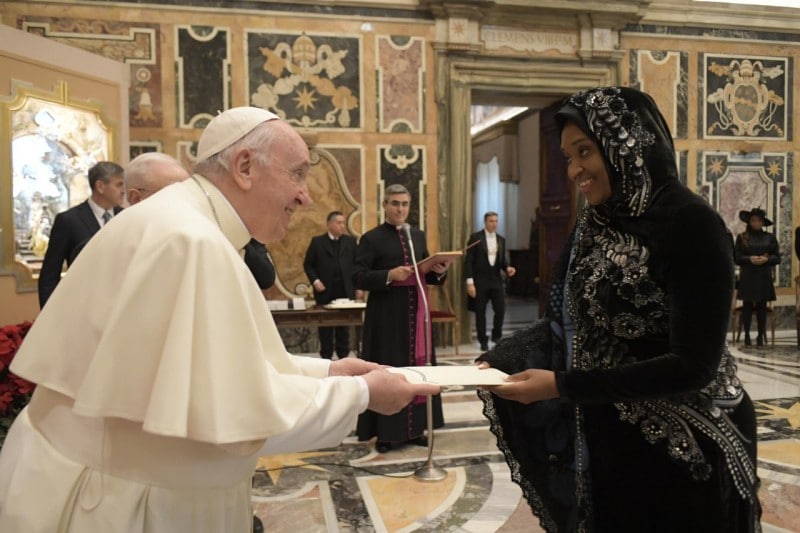Pope Francis today urged seven new ambassadors to the Holy See to approach world problems “in a solidary way and not in isolation.”
The new ambassadors, hailing from Moldova, Kyrgyzstan, Namibia, Lesotho, Luxembourg, Chad, and Guinea-Bissau, presented their credentials, an annual Vatican ceremony. He told the group that the continuing impact of the pandemic reminds leaders that we are a “global community” and requires recognition that “we are one human family; each of us is responsible for our brothers and sisters, none excluded.”
“While the pandemic has brought out the best of humanity in terms of individual and collective acts of generosity, service, and sacrifice, much more needs to be done on an institutional and intergovernmental level in furthering a ‘culture of encounter’ in service of the common good of our human family,” the Pope said. “This is a truth that should compel us to confront not only the current health crisis but all the problems plaguing humanity and our common home – poverty, migration, terrorism, climate change, to name a few – in a solidary way and not in isolation.”
Following are the Holy Father’s full remarks, provided by the Vatican:
Your Excellencies,
I am pleased to receive you for the presentation of the Letters accrediting you as Ambassadors Extraordinary and Plenipotentiary of your countries to the Holy See: Moldova, Kyrgyzstan, Namibia, Lesotho, Luxembourg, Chad, and Guinea-Bissau. I kindly ask you to convey my sentiments of esteem to your respective Heads of State, together with the assurance of my prayers that Almighty God will abundantly bless them and your fellow citizens with peace and prosperity.
When I gathered with your colleagues a little more than a year ago for the same ceremony, the world was still in the firm grip of the pandemic, yet signs of hope were emerging on the horizon as the initial vaccines were about to be administered. At the time, many believed that their arrival heralded a quick end to the pandemic. While great progress has been made since then, we see a year later how COVID-19 is still causing pain and suffering, not to mention the loss of life. It is important that the international community intensify its efforts of cooperation so that all people will have ready access to vaccines. This is not a matter of convenience or courtesy, but of justice.
The reality of the ongoing pandemic is yet another reminder that we are “a global community where one person’s problems are the problems of all” (Enc. Lett. Fratelli tutti, 32). Despite all of our medical and technological advances through the years, something microscopic – a seemingly insignificant object – has forever changed our world whether we fully realize it yet or not. As I had occasion to remark at the beginning of the pandemic, there is an urgent need to learn from this experience and open our eyes in order to see what is most important: one another (cf. Extraordinary Moment of Prayer, 27 March 2020). In particular, it is my sincere hope that through this experience the international community will come to a greater realization of the fact that we are one human family; each of us is responsible for our brothers and sisters, none excluded. This is a truth that should compel us to confront not only the current health crisis but all the problems plaguing humanity and our common home – poverty, migration, terrorism, climate change, to name a few – in a solidary way and not in isolation.
While the pandemic has brought out the best of humanity in terms of individual and collective acts of generosity, service, and sacrifice, much more needs to be done on an institutional and intergovernmental level in furthering a ‘culture of encounter’ in service of the common good of our human family. In this regard, the Holy See values the important role that you play, as evidenced by its own diplomatic presence and involvement in the international community. Your work, dear Ambassadors, is often done in silence and without public recognition. Yet you already understand what the world needs to learn from the pandemic: the need to cultivate relationships and facilitate mutual understanding with people of diverse cultures and backgrounds in order to work together for building a more just world. The main instrument at your disposal for carrying out this task is dialogue. In contrast to any pejorative conceptions of this powerful form of communication, diplomats realize the “patient and unassuming power of dialogue” (Meeting with Authorities, Civil Society and the Diplomatic Corps, Nicosia – Cyprus, 2 December 2021).
Dear Ambassadors, as you now begin your new mission, I offer you my prayerful good wishes and I assure you that the offices of the Holy See are ready to engage with you in a fruitful dialogue in order to address matters of common concern, especially those affecting humanity and our common home. Upon you, your families, your diplomatic collaborators, and staff, I cordially invoke abundant divine blessings. Thank you!










